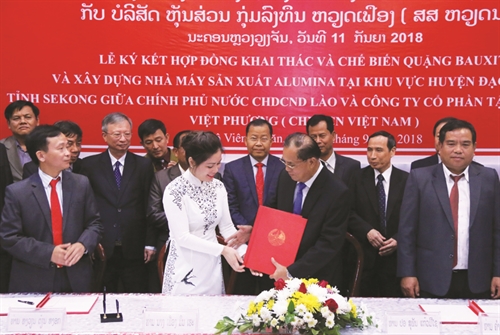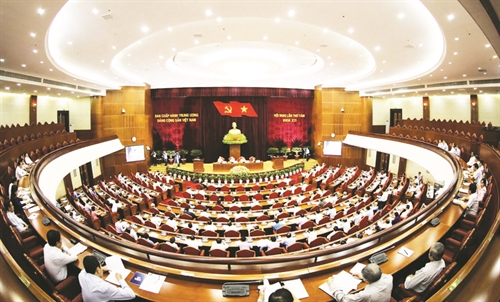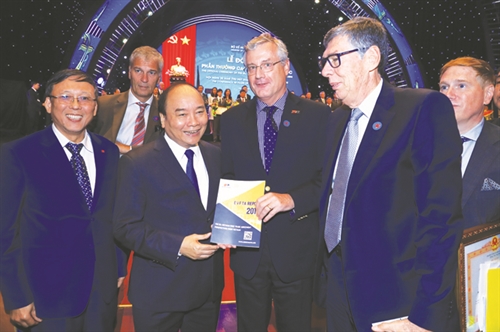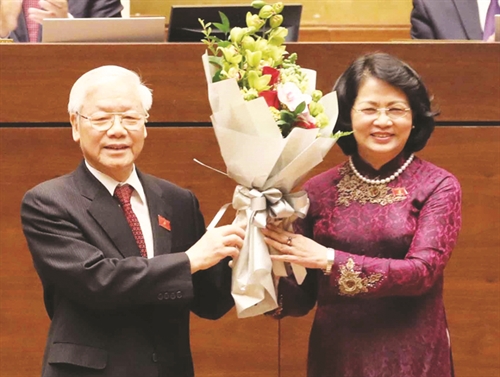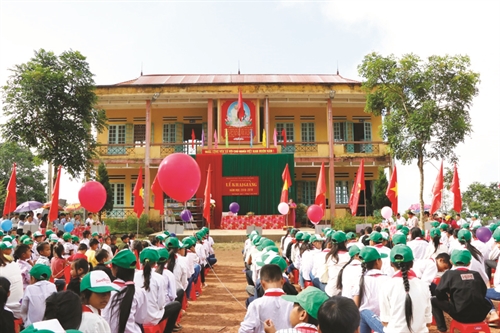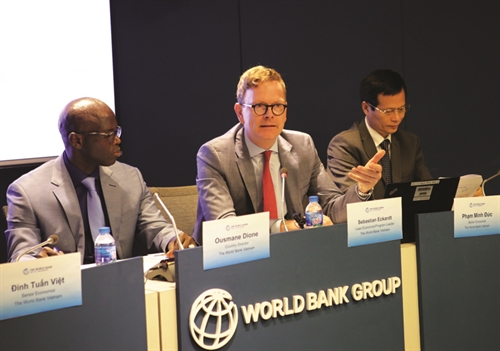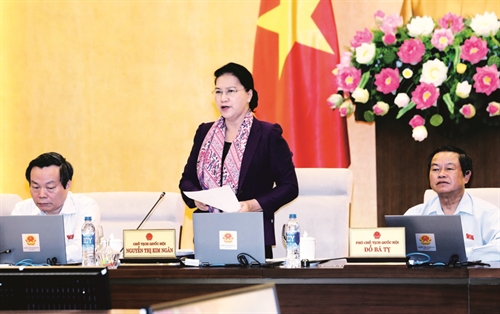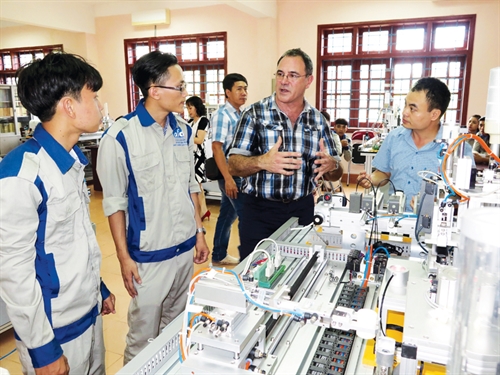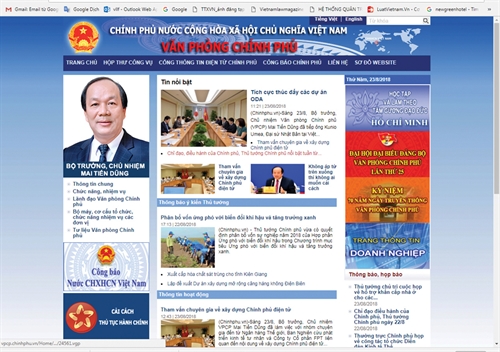Vietnam must become a strong and rich country based on the sea. This view is clearly articulated in the recently adopted Resolution of the Communist Party of Vietnam Central Committee on the strategy for sustainable development of the Vietnamese marine economy up to 2030, with a vision toward 2045.
Vietnam Law and Legal Forum would like to introduce important contents of this Resolution.
 |
| Thanks to financial supports, Quang Nam fishermen now have more strengths to sail to the sea__Photo: Huu Trung/VNA |
The Resolution affirms that the sea is a component of the national sovereignty, a living space, an international gateway closely associated with the national construction and defense. Vietnam must become a strong and rich country based on the sea, which develops sustainably, prosperously, securely and safely.
It says that Vietnam will sustainably develop its maritime economy together with ensuring national defense and security, firmly maintaining independence, sovereignty and territorial integrity, enhancing external relations and international cooperation on the sea, contributing to maintaining a peaceful and stable environment conducive to development.
The country will sustainably develop its marine economy on the basis of green growth, conservation of biodiversity and marine ecosystems; ensuring harmony between economic and natural ecosystems, between conservation and development, and between the interests of coastal and landlocked localities.
It will need to promote the linkage and restructuring of sectors and fields for higher productivity, quality, efficiency and competitiveness; and bringing into play the potential and advantages of the sea, creating a momentum for national economic development.
The country will enhance integrated and unified management of marine resources, protect the marine environment, conserve biodiversity and natural marine ecosystems, and proactively respond to climate change and sea level rise. It will invest more in the conservation and development of biodiversity values, restoration of marine ecosystems and protection of the integrity of the ecosystems from the shore to the sea.
The protection of the marine environment will be combined with the prevention and preclusion of environmental pollution and incidents.
More state budget funds will be allocated for investment in marine research and baseline survey and human resources training, in addition to mobilizing resources inside and outside the country.
The Resolution sets forth various objectives for 2030.
The overall objective is to turn Vietnam into a powerful marine country, basically achieving the criteria of a sustainably developed marine economy. The country will form a marine ecological culture, proactively adapt to climate change and sea level rise; preclude the pollution and degradation of the marine environment, coastal landslide and erosion; and restore and conserve important marine ecosystems.
Specifically, the country will achieve marine and ocean governance and coastal zone management indicators in conformity with the international standards, reaching the level of upper-middle class countries in the world. Most of sea-and island-related socio-economic development activities will adhere to the principle of integrated management suitable to the marine ecosystem.
Sea-based industries will contribute about 10 percent and the economy of the 28 coastal provinces and cities will make up 65-70 percent of the country’s GDP.
The human development index (HDI) of the coastal provinces and cites will be higher than the national average level. Per-capita income of these localities will be at least 1.2 times higher than that of the whole country.
Vietnam will approach and make the fullest use of scientific and technological advances and emerge as one of leading countries in ASEAN in the field of marine science, technology and human resources. In some areas of marine science and technology, it will strive to reach the world’s advanced level.
At least half of Vietnam’s maritime zones will be surveyed in terms of marine resources and environment and presented on maps of the 1:500.000 scale. A digitalized database on the sea and islands will be established, shared and updated.
In the coastal provinces and cities, all hazardous wastes and solid household wastes will be collected and treated up to the environmental standards.
All coastal economic zones, industrial parks and urban centers will be planned and constructed in a sustainable, ecological and smart manner, with centralized wastewater systems meeting the environmental standards.
Marine, coastal and island ecosystems will be properly managed and protected. Marine and coastal parks and reserves will account for at least 6 percent of the natural area of the country’s maritime zones.
The capacity of forecasting and warning natural disasters, earthquakes and tsunamis, monitoring and supervising the marine environment, climate change and sea level rise, including through the application of space technology and artificial intelligence, will reach the level of the advanced countries in the region. Measures will be taken to prevent and limit the impacts of flooding tides, saltwater intrusion and coastal erosion.
By 2045, according to the Party document, Vietnam will become a powerful marine country, with the marine economy making important contributions to the national economy. It will proactively and responsibly participate in addressing international and regional issues of the sea and the ocean.
The Resolution puts forward a number of major policies.
By 2030, Vietnam will successfully develop with breakthroughs in six marine economic sectors, placed in order of priority: tourism and marine services; maritime economy; exploitation of oil and gas and other marine mineral resources; aquaculture and fishing; coastal industry; and renewable energy and new marine economic sectors.
Regarding tourism and sea services, the Resolution attaches importance to investment in tourist infrastructure, stating that all economic sectors will be encouraged and provided with favorable conditions to develop and contribute to the development of ecological tourism, scientific exploration, community-based tourism, and high-quality resorts in coastal areas; and diversify international marine tourism products and brands. Coastal inhabitants will be assisted in changing their trades which are likely to harm and negatively affect the sea to trades that help protect and preserve the sea.
Regarding maritime economy, the focus will be placed on efficient exploitation of seaports and ocean-shipping services. Vietnam will plan, build, and synchronously and effectively operate integrated seaports, international transshipment ports and special-use ports in combination with support services; complete logistics infrastructure and transportation routes linking seaports with localities across the country and other countries. It will boost the development of a rationally structured shipping fleet applying modern technology to provide high-quality services and deeply participate in the transport supply chains, step by step increasing the international market share.
On the exploitation of oil and gas and other marine resources and minerals, it is necessary to step up the search for, exploration and increase of petroleum reserves; and assessment of potentials of other marine resources and minerals, deep-sea minerals, especially those with high reserves, high value and strategic significance. Exploitation and processing will be harmoniously combined with protection of the marine environment and conservation of marine biodiversity.
Regarding aquaculture and fishing, traditional farming and fishing methods will be changed to industrial methods applying high technology. Fishing activities will be reorganized to reduce onshore fishing, intensify offshore and ocean fishing, and strictly prohibit destructive fishing. More funds will be invested in the upgrading of fishing ports, fishing wharves and anchorage areas, and fishing logistics services will be well organized.
Coastal industry will be developed according to planning and based on the natural advantages of each region, giving priority to the application of environment-friendly high technologies, platform or source technologies. Shipbuilding and repair, petrochemical refining, energy, mechanical engineering, processing and supporting industries will be rationally developed.
As for renewable energy and new marine economic sectors, the Resolution says Vietnam will increase investment in the building and operation of wind mills, solar power farms and other types of renewable energy. Attention will be paid to developing some economic activities based on exploitation of marine biodiversity resources such as marine medicine materials, cultivation and processing of algae and seagrass.
In the coming years, Vietnam will focus on developing and expanding models of coastal economic zones and eco-industrial zones along with forming and developing strong marine economic centers, in which coastal economic zones will play a key role in regional development and inter-region connection.
The country will develop its maritime zones based on the advantages of natural conditions, ensuring harmony between conservation and development. The sea will be zoned off into restricted and reserve areas, buffer areas, and areas for socio-economic development.
The Resolution determines that the northern sea and coastal area (from Quang Ninh to Ninh Binh province) will be further developed, with Hai Phong and Quang Ninh to become a center of marine economy, and Quang Ninh a national tourism center connected with major international tourism centers in the region and the world.
In the northern and coastal central region (from Thanh Hoa to Binh Thuan province), Vietnam will develop deep-sea international transshipment seaports and special-use seaports in association with industrial, oil and gas, electricity, renewable energy and clean industry complexes. Major tourist centers; aquaculture, fishing, seafood processing, logistics services and fisheries infrastructure will also be developed in this region.
In the sea and coastal area of the southeast region (Ba Ria-Vung Tau province and Ho Chi Minh City), international container seaports, seaport logistics services, maritime safety assurance services and oil and gas exploitation and processing, allied industries and petroleum services will be developed.
As for the southwest region (Tien Giang, Ca Mau and Kien Giang provinces), Phu Quoc island will be built into an international marine tourism and ecotourism service center. Efforts will be concentrated on developing gas industry, gas processing, gas-fired electricity generation, renewable energy, aquaculture and fishing, logistics services, and fishery infrastructure connected with major economic centers in the region and the world.
The Resolution also highlights the importance of environmental protection and conservation and sustainable development of marine biodiversity. Marine reserves will be established and expanded on the basis of national marine space planning.
It stresses the need to prevent the occurrence of polluting incidents, reduce and effectively deal with polluting sources, hazardous chemicals on the sea, and manage marine litter, especially plastic litter.
The country will also strive to improve coastal inhabitants’ living standards, build a marine culture and a society closely attached and friendly to the sea.
Regarding national defense, security, foreign relations and international cooperation, the Resolution says Vietnam will prioritize the modernization of a number of military services, armies and law enforcement forces at sea, ensuring the capacity to properly respond to all circumstances occurring on the sea. It will persist in building and maintaining a peaceful and stable environment and legal order at sea, thus creating the basis for the safe and effective exploitation and utilization of the marine resources.
The Resolution identifies seven major solutions.
The first is to strengthen the leadership of the Party, promote propaganda, raise public awareness about sustainable development of the sea, create a consensus in the whole society.
The second is to improve institutions, policies, strategies, master plans and plans on sustainable development of the marine economy in conformity with treaties to which Vietnam is a contracting party.
Vietnam will actively participate in establishing global and regional mechanisms related to the sea and the ocean.
The third is to develop science and technology and intensify marine baseline survey.
The fourth is to promote education, training and development of human resources for the marine economy.
The fifth is to strengthen the capacity to ensure national defense, security and law enforcement on the sea.
The sixth is to proactively promote and expand external relations and international cooperation on the sea.
The seventh is to mobilize resources, encourage all economic sectors to invest in sustainable development of the sea, and build strong marine business groups.
Based on the above contents of the Resolution, the Government, local administrations and related agencies will formulate strategies, master plans, policies, laws, programs and projects for its materialization, especially the mobilization of resources under medium-term investment plans for development of the marine and coastal economy in the coming time.- (VLLF)

